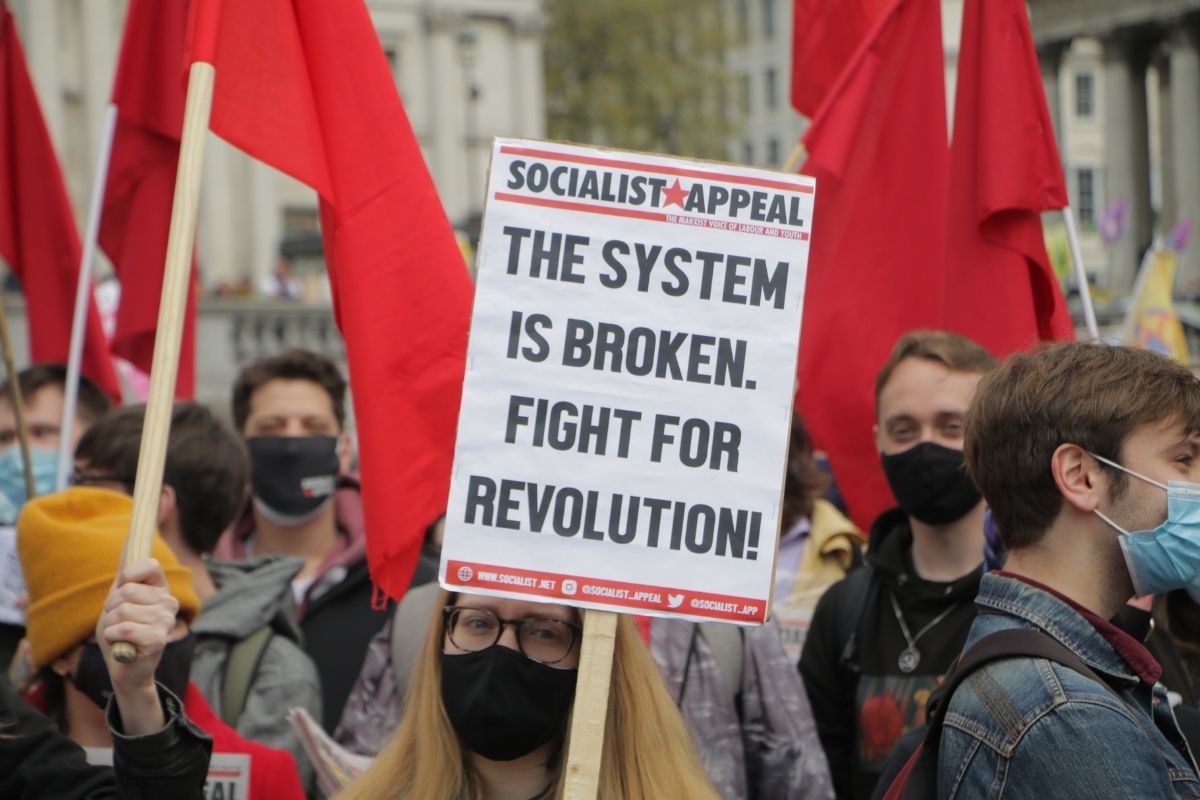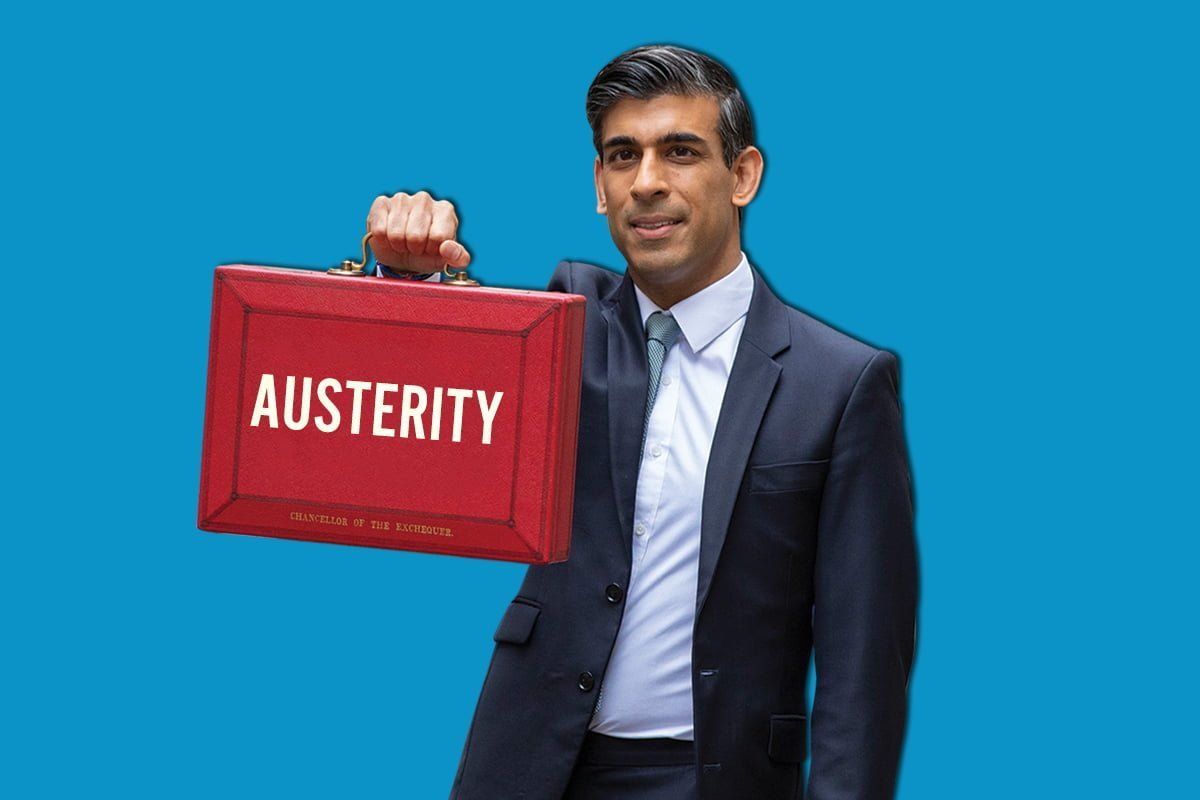The latest Tory Budget announcement was little more than a vain attempt to distract from the deepening crisis facing British capitalism. The working class is being bombarded from all sides. Only bold socialist policies can offer a way out.
A perfect storm is brewing for British capitalism. A century of decline. A decade of austerity. The seismic dislocation of Brexit. The chaotic fallout from the pandemic. A mountain of debt. And now inflation raging as supply shocks – from COVID to war – rain down on the global economy.
All of this forms the turbulent backdrop to Rishi Sunak’s latest Budget announcement, revealed in Parliament yesterday.
The Tory Chancellor attempted to distract from the doom and gloom with a few paltry headline promises about fuel duty and National Insurance (NI). But this was little more than a sleight of hand from Sunak; a conjuring trick designed to hide the dramatic squeeze facing the working class.
Devastation

The Office for Budget Responsibility (OBR), the government’s ‘independent’ financial watchdog, provided a more revealing picture, however, with drastic downgrades to its forecasts for the UK economy.
Growth predictions of 6% for 2022 and 2.1% in 2023 from last October’s projections have now been reduced to 3.8% and 1.8% respectively.
At the same time, the OBR now estimates that inflation will rise to an eye-watering 7.4% on average this year, up from an already three-decade high of 6.2% in February.
And with the energy price cap set to increase by over 50% next month, and again in the autumn, household bills are likely to rise to over £3,000 per year on average. This, the OBR suggests, could see inflation peak at around 9% by the end of the year.
The result is that ordinary families will be hammered. According to the OBR, aggregate household disposable incomes will decline by 2.2% in real terms between 2021-22 and 2022-23: “The largest fall in a single financial year since [official] records began in 1956-57.”
This is the devastation that lies ahead for the working class under capitalism.
Destitution
Having sprayed money all over the economy during the pandemic to prevent an implosion, the Tory Chancellor is now expecting workers and the poor to clean up the mess.
Rising prices mean a stealthy increase in tax revenue for the Treasury – and an ever-greater attack on living standards for ordinary people.
But unsurprisingly, Sunak has chosen to pocket his estimated £50 billion windfall in order to offer some pre-election prizes, instead of providing any measures to address the immediate ‘cost-of-living catastrophe’ facing the working class.
“He has abandoned many to the threat of destitution,” stated Dave Innes, head of economics at the Joseph Rowntree Foundation, responding to Sunak’s speech.
Whilst throwing red meat to rabid Tory backbenchers, the Chancellor offered nothing to alleviate the pain for workers and the most vulnerable.
A proposed £6 billion cut to NI contributions from July, for example, only partially makes up for the £12 billion increase already planned for next month. As ever with the Tories, it is a case of ‘smoke and mirrors’: giving with one hand, only to take away even more with the other.
Similarly, there was no life line for those in unemployment or on benefits. The post-lockdown £20 per week cut to Universal Credit will not be reversed. And whilst inflation heads towards nine or ten percent, welfare payments are only set to increase by 3.1% – a massive cut in real terms, just as with workers’ wages.
Cuts

Public services are also going to be “hollowed out by inflation”, according to the Financial Times.
Not only do soaring prices equate to greater real-term costs for government departments; but with the Bank of England raising interest rates in order to cool the economy, the cost of servicing national debts is set to balloon, taking a further chunk out of the public purse.
Debt interest payments are predicted to see a fourfold increase to £83bn next year – more than the combined budget for schools, the Home Office, and the Ministry of Justice.
Austerity, in other words, is here to stay. This means further cuts to council services. It means further attacks on public sector pay, at a time when nurses, teachers, and workers in local government are already struggling to keep up with inflation.
And for Boris Johnson and the Tories, it means more broken promises; more splits, divisions, and political crises; and more stench, sleaze, and scandal, as the lid is lifted once again on the establishment’s cesspit of corruption.
Crisis
The whole world economy is being torn apart by the chaos and damage inflicted by coronavirus, the conflict in Ukraine, and the sanctions imposed by Western imperialism in response.
“The era of globalisation is over,” stated Larry Fink, the chair of investment giant Blackrock, in a recent letter to shareholders, warning his fellow capitalists of the dangers that lie ahead.
Capitalism is plunging ever-deeper into crisis. We are entering uncharted waters. Sunak’s Spring Statement, in this respect, is akin to rearranging the deckchairs on the Titanic.
Starmer’s Labour, similarly, offers no solutions to workers. Responding to her Tory counterpart’s announcement yesterday, all that Shadow Chancellor Rachel Reeves could suggest was a windfall tax on oil and gas companies.
But this is little more than a tokenistic gesture from Reeves and Starmer. After all, at the same time, the Labour leaders have fallen over themselves in their efforts to cosy up to big business.
Socialism

Most importantly, demands for a windfall tax do not go far enough. Tinkering around the edges will not suffice. You cannot cure cancer with an aspirin.
The working class are being battered by wave after wave of inflation, austerity, and attacks. The brutal ‘jobs massacre’ by bosses at P&O Ferries is a taste of what lies in store for workers everywhere.
The cost-of-living crisis is a crisis of capitalism; the product of an anarchic system based on profit, private ownership, and competition. Only bold socialist policies can offer a way out of this capitalist quagmire.
Instead of feeble appeals to ‘tax the rich’, the labour movement must call for nationalisation of the energy monopolies, and of all the other parasites and profiteers; for a minimum wage of £15 per hour, and for pay linked to prices; and for big business to open up their books, so that workers can see who the real winners and losers on the back of skyrocketing prices.
Only by expropriating the billionaires, bosses, and bankers, and bringing in a rational, democratic, socialist plan of production can we fight the menace of inflation and offer a genuine alternative to the dead end of capitalism.






